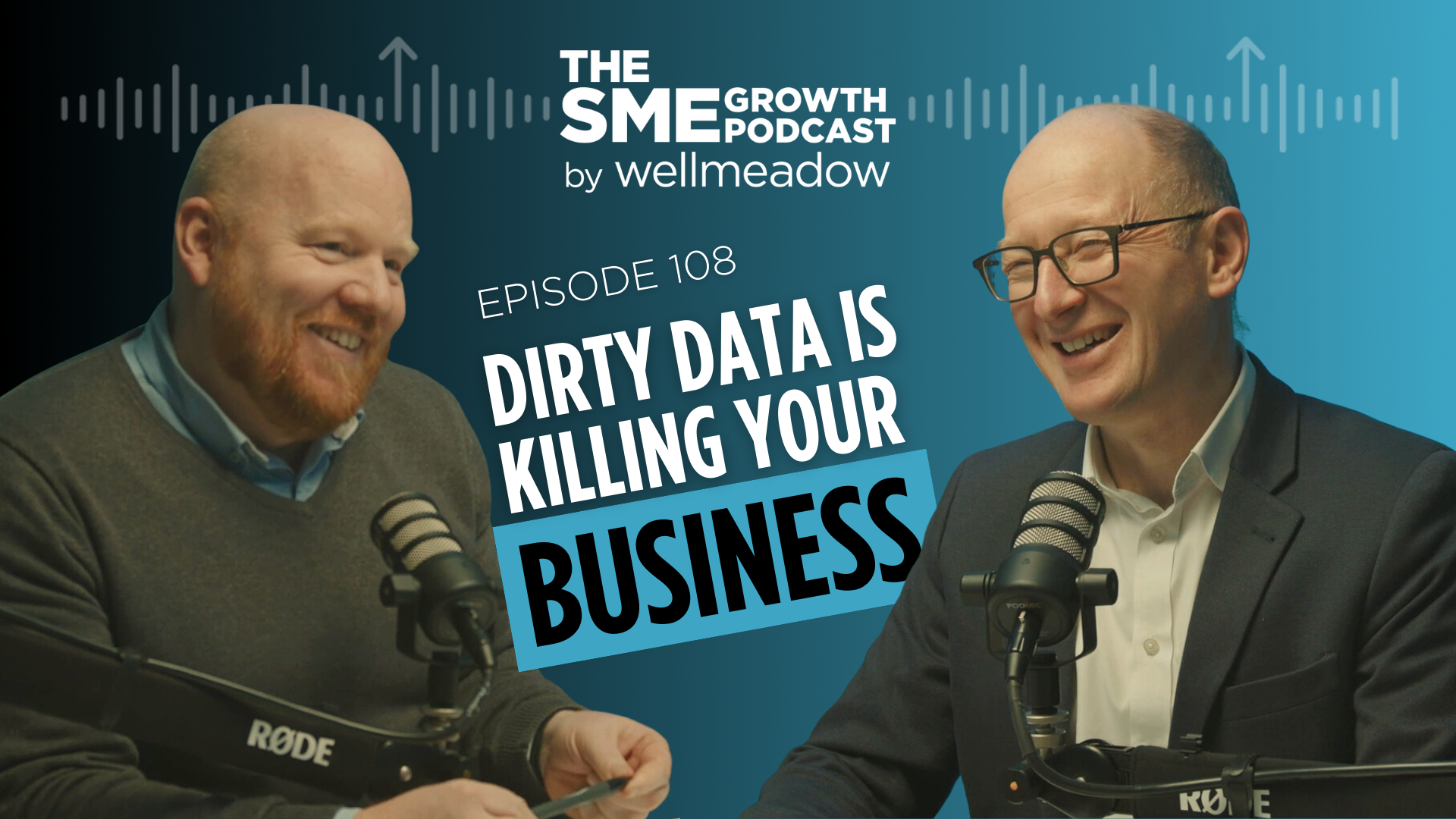In this eye-opening episode, Dave Parry and Richard Buckle challenge the common perception that data management is merely an administrative function by revealing how data quality directly impacts business performance and profitability. Drawing from recent MIT research and their extensive consulting experience, they demonstrate how neglected CRM systems silently erode business value while creating a culture of inefficiency. Beyond just highlighting the problem, they provide a strategic framework for business leaders to transform their approach to data governance, turning what many consider a mundane housekeeping task into a powerful driver of business intelligence and growth opportunities.
Head over to our YouTube channel and subscribe for exclusive content and a chance to see the fully clothed versions of our episodes: @TheSMEGrowthPodcast.
You can listen to the full episode here
Listen to the full episode now



Key Topics Discussed
The Business Impact of Dirty Data
- Examination of MIT research showing dirty data can consume 15-25% of operating profits
- Analysis of both direct costs (incorrect billing, missed price increases) and opportunity costs
- Discussion of how poor data quality undermines marketing effectiveness and ROI
- Exploration of how data quality directly affects company valuation during M&A activities
- Assessment of the cultural impact when teams lose faith in CRM systems
Data Management as a Leadership Responsibility
- Investigation of why data governance must be owned at leadership level rather than delegated
- Analysis of how different leadership styles (particularly "yellow" personalities) may neglect data quality
- Examination of the strategic value of data as "the new oil" in modern business operations
- Discussion of how leadership involvement reveals process improvements and strategic opportunities
- Consideration of data quality's importance during due diligence and business valuation processes
Lead Qualification and Data Architecture
- Detailed breakdown of the journey from Marketing Qualified Lead (MQL) to Sales Qualified Lead (SQL)
- Exploration of scoring models for lead qualification and how they drive resource allocation
- Analysis of how improper contact categorization creates pipeline management challenges
- Discussion of the "white spaces" matrix concept for identifying cross-selling opportunities
- Examination of how segmentation failures lead to untargeted and ineffective marketing efforts
Practical Data Governance Strategies
- Assessment of the "sinking boat" metaphor - whether to bail water or fix leaks first
- Exploration of systems for marking records for deletion versus permanent removal
- Discussion of automation possibilities using AI for data cleaning and enrichment
- Analysis of permission structures needed for effective data management
- Investigation of how to develop standardized processes for data entry and maintenance across departments
Quotes to Remember
"A lot of value in your business is going to be centred around your data and increasingly so. So actually this really is a leadership thing."
"Dirty data can consume up to 15 to 25% of a company's operating profit."
"If you don't have a reliable set of customer, past customer, and prospect data in your own database, you're no better than a Start-Up."
"It's not an IT problem. This needs to be led by people who really care about what you're going to do with the data."
Top Takeaways
- Elevate Data Management to Leadership Level: Recognize that data integrity isn't an IT or admin issue but a strategic business asset requiring executive attention. Spending even half a day personally exploring your CRM reveals opportunities and process improvements invisible from summary reports.
- Implement the Four-Pillar Framework: Build your data governance strategy around accuracy (correct information), completeness (all necessary fields), timeliness (regular updates), and consistency (standardized processes). This comprehensive approach addresses both technical and cultural aspects of data management.
- Distinguish Between Different Contact Types: Create clear categorization systems that separate genuine prospects from general contacts. Understanding where someone sits in your qualification process (MQL vs SQL) enables appropriate resource allocation and prevents wasted effort on unqualified leads.
- Establish Both Entry and Exit Processes: Most organizations focus only on getting data in, creating bloated systems. Implement formal review cycles and "marked for deletion" workflows to maintain database health without risking premature removal of valuable contacts.
- Connect Data Quality to Business Outcomes: Make the link between clean data and specific business results explicit for your team. When people understand how data quality directly impacts their ability to identify opportunities, close deals, and demonstrate success, compliance becomes motivation-driven rather than administrative.
Head over to our YouTube channel and subscribe to The SME Growth Podcast. Share your thoughts and business challenges in the comments section of our community page: https://www.youtube.com/@TheSMEGrowthPodcast/community
